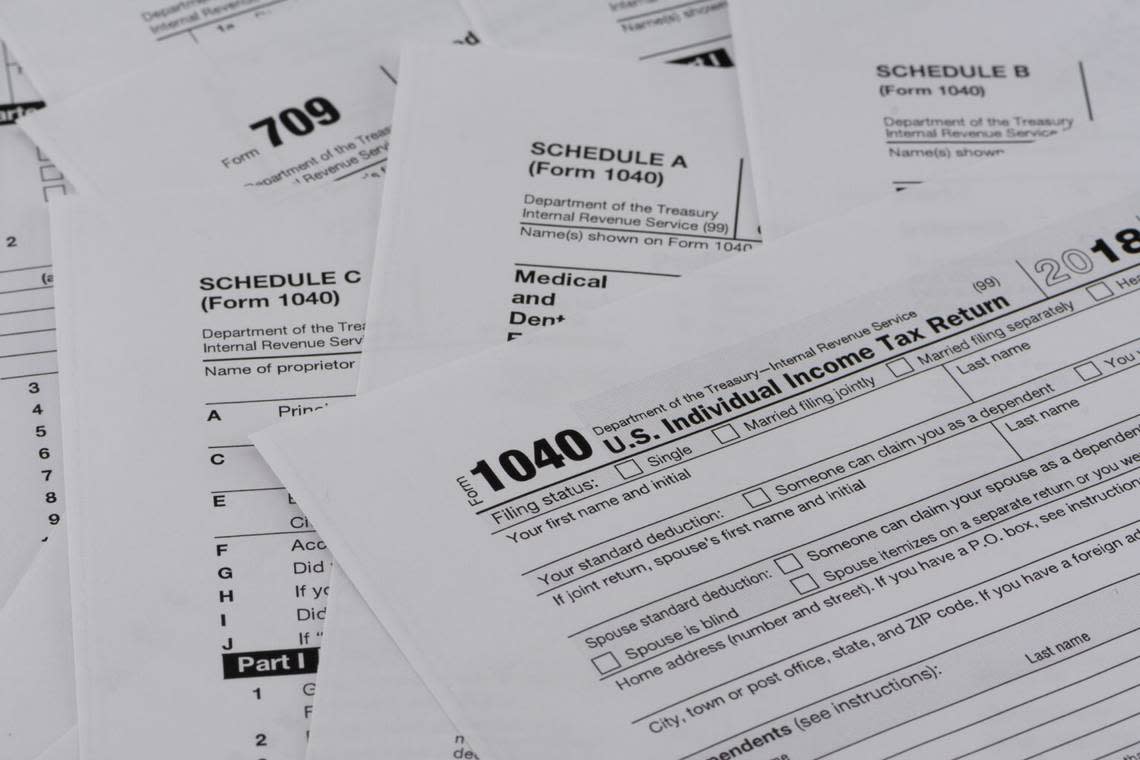Taxpayers lost $4.2 million to IRS imposters last year. Here are 12 scams to look out for

In 2023, taxpayers lost $4.26 million in IRS imposter scams.
That’s according to data from the Federal Trade Commission, which received 2,847 reports of an IRS imposter, down from 3,162 reports in 2022 with $6.92 million in total losses. And that’s just one type of scam.
The IRS issues an annual list, the “Dirty Dozen,” of scams that put taxpayers, businesses and tax professionals at risk for losing money, personal information and data.
“Scammers are coming up with new ways all the time to try to steal information from taxpayers,” IRS Commissioner Danny Werfel said in a 2023 news release. “People should be wary and avoid sharing sensitive personal data over the phone, email or social media to avoid getting caught up in these scams. And people should always remember to be wary if a tax deal sounds too good to be true.”
Remember: The IRS does not initiate contact with taxpayers through email, text or social media to ask for personal or financial information. Most contacts will come through mail delivered by the Postal Service.
The scams to watch for
Employee Retention Credit claims
Watch out for scammers who try to con ineligible taxpayers into claiming the Employee Retention Credit. Some advertisements only try to steal your personal information to steal your identity.
Phishing and smishing
Be wary of unsolicited texts (smishing) or emails (phishing). Scammers pose as legitimate organizations such as the IRS to lure you into providing personal and financial information.
Online account help from third-party scammers
You can open your own online account through IRS.gov and don’t need help to do so.
False Fuel Tax Credit claims
This tax credit isn’t available to most taxpayers because it’s designed for off-highway business and farming use. But the IRS said it saw an increase last year in promoting credits such as that one.
Fake Charities
When you’re donating to a charity and planning to claim a deduction, make sure you’re donating to a qualified tax-exempt organization that the IRS recognizes — otherwise it won’t count.
“Ghost” preparers
The IRS also warns taxpayers to take caution when choosing a tax professional to prepare their taxes. Regardless of who prepares the tax return, you, as the taxpayer, are ultimately responsible for what’s on it, according to the IRS.
You should avoid a preparer who won’t sign the tax return, one who bases fees on a percentage of the refund, or who offers to deposit your refund into their own accounts. The IRS recommends being wary of preparers who claim they can get you a larger refund.
A “ghost” preparer could prepare the return but refuse to sign.
If you’re looking for a professional, visit the IRS Directory of Federal Tax Return Preparers with Credentials and Select Qualifications. They should have a valid Preparer Tax Identification Number.
Social media: Fraudulent form filing and bad advice
Watch out for misleading information online.
Spearphishing and cybersecurity for tax professionals
Spearphishing is a phishing attempt targeting a specific organization or business, according to the IRS. If it’s successful, it could lead to a data breach that could allow the scammer to file fraudulent tax returns.
Offer in Compromise mills
You can check your eligibility for free for Offers in Compromise, which is a program that helps people who can’t pay settle federal tax debts. “Mills” can mislead taxpayers who don’t qualify.
Schemes aimed at high-income filers
Charitable Remainder Annuity Trusts and monetized installment sales are two schemes that target high-income filers. The first can be misused while trying to get rid of ordinary income or capital gain on the sale of the property. The monetized installment sales could be “potentially abusive transactions,” according to the IRS.
Bogus tax avoidance strategies
Two types of tax avoidance strategies, according to the IRS, are micro-captive insurance arrangements (which lack many legitimate insurance features) and syndicated conservation easements (which leads to inflated tax deductions in abusive arrangements).
Schemes with international elements
The IRS pointed to three types of internationally-related schemes: offshore accounts and digital assets, Maltese individual retirement arrangements misusing treaty, and Puerto Rican and foreign captive insurance.
How to report a scam
You can report a phishing scam (such as if you receive an unsolicited email claiming to be from the IRS) to phishing@irs.gov. If you lose money as a result of the scam, contact the Treasury Inspector General Administration and the Federal Trade Commission.
You can report preparer misconduct to the IRS through Form 14157, Complaint: Tax Return Preparer.
If you think a preparer filed or changed your return without your consent, file Form 14157-A, Tax Return Preparer Fraud or Misconduct Affidavit.
You can file a whistleblower claim through Form 211, Application for Award for Original Information.
What is The Sum?
The Sum is your friendly guide to personal finance and economic news.
We’re a team of McClatchy journalists cutting through the financial jargon so you know how these issues impact your life. We verify information from diverse sources and keep the facts front-and-center, making finance and economic news add up for you.
Ready to take the first step to getting your finances under control? You can sign up for our five-week budgeting newsletter at thesum.news.

